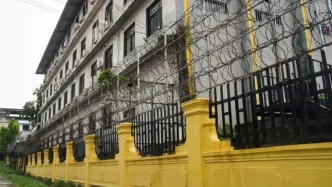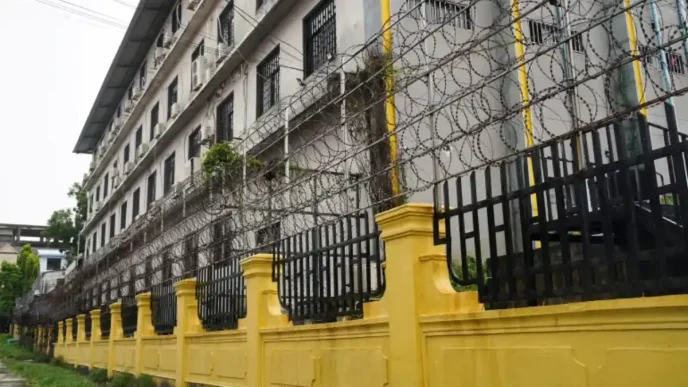MANILA – The Philippine National Bureau of Investigation (NBI) has intensified its efforts to combat the spread of disinformation, identifying 20 vloggers suspected of disseminating fake news targeting government officials. Amid rising political tensions, NBI Director Jaime Santiago announced on Monday that the agency is not only pursuing individual content creators but also probing potential financial backers behind what appears to be a coordinated campaign.
A Coordinated Disinformation Campaign?
Speaking to reporters after a graduation ceremony at the NBI Academy in Manila, Santiago expressed concern over the unified nature of the disinformation being spread. “We are looking at why they are increasing in number. Why does it seem that they have only one theme — riding on the disturbances in our political atmosphere? This should not happen. Our country is in trouble. Citizens will be confused” he said, highlighting the potential impact on public trust and national stability.
The NBI’s investigation, still in its early stages, is focusing on whether these vloggers are operating independently or under the direction of larger entities. Santiago indicated that the agency is actively tracing funding sources to uncover any orchestrators behind the scenes. “We are looking into whether they have someone leading them” he noted, suggesting a deeper network may be at play. While no specific evidence of such coordination has been publicly confirmed, the suspicion of organized efforts underscores the gravity of the issue in a country already grappling with polarized political discourse.
Collaboration and Challenges
Recognizing the multifaceted nature of the problem, the NBI is not working alone. Santiago revealed that the agency recently met with the Department of Information and Communications Technology (DICT) and the National Telecommunications Commission (NTC) to strategize on curbing the spread of fake news. “Last week, we had a meeting with the DICT and the NTC to discuss how we can once and for all stop these fake news spreaders, bloggers, and content creators” he said. This inter-agency approach signals a broader governmental push to address digital disinformation, which has become a pervasive issue in the Philippines, particularly during election cycles and periods of political unrest.
However, the investigation faces significant hurdles, particularly with jurisdictional issues. Many vloggers and content creators operate from overseas, complicating enforcement efforts. Santiago pointed out the legal disparities between countries, using the United States as an example. “In the US, for example, libel is a civil case, not a criminal one. So, if a blogger is a US citizen, how can we enforce our laws on their citizens, especially when their laws differ from ours?” he explained. This legal gray area poses a challenge to holding foreign-based individuals accountable under Philippine law.
Despite these obstacles, the NBI is exploring alternative avenues for prosecution. Santiago mentioned potential charges such as inciting to sedition, a crime recognized in both the Philippines and other jurisdictions like the US. He also referenced the possibility of investigating financial irregularities, drawing a parallel to the infamous Al Capone case, where tax evasion charges were used to convict the notorious gangster. “We are looking at all angles. For example, they could be inciting to sedition, which is a crime in the US and here. We are also looking into tax evasion” he added. Additionally, the NBI is considering extradition requests and collaboration with Interpol to pursue overseas suspects.
Balancing Freedom of Speech and Accountability
The crackdown has raised questions about the balance between curbing disinformation and protecting freedom of expression, a cornerstone of democratic societies. Critics argue that aggressive enforcement could stifle legitimate dissent or criticism of the government. Santiago addressed these concerns directly, emphasizing that the NBI respects constitutional rights but draws a line at harmful content. “Freedom of speech, freedom of expression — that’s okay. However, when it crosses the line and becomes inciting to sedition or libel, we need to stop it” he stated, underscoring the agency’s intent to target only those who overstep legal boundaries.
This stance reflects a broader debate in the Philippines, where the government has faced accusations of using anti-disinformation measures to silence opposition voices. High-profile cases, such as the cyber-libel conviction of journalist Maria Ressa, have drawn international scrutiny and fueled concerns about press freedom. While the NBI’s current focus appears to be on vloggers rather than traditional media, the potential for overreach remains a contentious issue. If the investigation expands to include broader categories of online content creators, it could set a precedent for how digital speech is regulated in the country.
The Wider Context of Disinformation in the Philippines
The Philippines has long been a battleground for digital disinformation, with social media platforms serving as both a tool for public engagement and a vector for false narratives. During the 2016 and 2022 presidential elections, fake news and troll armies were widely documented as influencing voter perceptions, often amplifying divisive rhetoric. Studies by local and international organizations have pointed to the role of paid influencers and coordinated online campaigns in shaping political outcomes, raising alarms about the integrity of democratic processes.
The current wave of disinformation targeting government officials, as described by Santiago, fits into this troubling pattern. While the NBI has not disclosed specific examples of the fake news in question, the agency’s emphasis on a singular “theme” suggests a targeted effort to undermine specific figures or policies. If confirmed, such coordination could indicate a sophisticated operation, potentially involving domestic or foreign actors with vested interests in destabilizing the political landscape.
Beyond immediate political implications, the spread of fake news poses risks to public safety and social cohesion. Misinformation about government actions or crises can erode trust in institutions, fuel unrest, or incite violence. In a country with a history of political volatility, including coups and insurgencies, the stakes of unchecked disinformation are particularly high. The NBI’s response, while focused on enforcement, also highlights the need for broader solutions, such as digital literacy campaigns and platform accountability, to address the root causes of the problem.
Looking Ahead: Enforcement or Overreach?
As the NBI deepens its investigation, several questions loom large. Will the agency uncover concrete evidence of financial backers or coordinated campaigns behind these vloggers? How will it navigate the legal and diplomatic challenges of pursuing overseas suspects? And perhaps most critically, can it strike a balance between combating disinformation and safeguarding free expression, without fueling perceptions of censorship?
For now, the list of 20 vloggers remains a starting point in a complex battle against fake news. The outcome of this probe could shape not only the future of online content regulation in the Philippines but also the broader regional discourse on digital governance. As Santiago and his team press forward, their actions will likely be watched closely by both domestic critics and international observers, eager to see whether this crackdown marks a step toward accountability or a slide toward suppression.
In a nation where digital platforms have become arenas for both democracy and deception, the fight against disinformation is far from straightforward. As the NBI pushes to unmask those behind the spread of fake news, the challenge will be to protect the public without undermining the very freedoms that define it.














